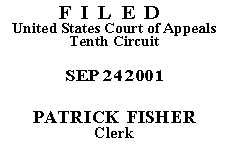

| GREGORY BURCHER,
Plaintiff-Appellant, v. QUINCY HILL TOWNHOUSE ASSOCIATION and JUDY LOTT, Defendants-Appellees. |
|
Plaintiff Gregory Burcher brought suit against his homeowners' association and one of its representatives, asserting violations of his constitutional rights, federal law, and state tort law. Some of plaintiff's claims were settled or withdrawn. On the remainder, the district court granted summary judgment in favor of defendant Quincy Hill Townhouse Association and granted defendant Judy Lott's motion to dismiss. The court also assessed attorney's fees in the amount of $54,066.71 against plaintiff. He appeals. We have jurisdiction under 28 U.S.C. § 1291.
The parties are familiar with the facts and we need not repeat them here. "We review the district court's grant of summary judgment de novo, applying the same legal standard used by the district court." Simms v. Okla. ex rel. Dep't of Mental Health & Substance Abuse Servs., 165 F.3d 1321, 1326 (10th Cir. 1999). Summary judgment is proper if the moving party shows that "there is no genuine issue as to any material fact and that the moving party is entitled to a judgment as a matter of law." Fed. R. Civ. P. 56(c). "When applying this standard, we view the evidence and draw reasonable inferences therefrom in the light most favorable to the nonmoving party." Simms, 165 F.3d at 1326.
Because the legal sufficiency of a complaint is a question of law, we also review de novo a dismissal under Fed. R. Civ. P. 12(b)(6) for failure to state a claim. Sutton v. Utah State Sch. for the Deaf & Blind, 173 F.3d 1226, 1236 (10th Cir. 1999). A court considering a Rule 12(b)(6) motion accepts all well-pleaded allegations in the complaint as true, viewing them in the light most favorable to the nonmoving party. Id. "A 12(b)(6) motion should not be granted unless it appears beyond doubt that the plaintiff can prove no set of facts in support of his claim which would entitle him to relief." Id. (quotation omitted).
Plaintiff argues that: (1) a homeowners' association is the functional equivalent of a municipality with general governmental powers over its members such as to act under color of law; (2) the district court improperly assessed attorney's fees against him; (3) Colo. Rev. Stat. § 13-17-201 cannot be applied to this case and does not support an award of attorney's fees against him; (4) the district court's order is inadequate to establish the reasonableness of attorney's fees.
We have carefully reviewed the district court's decisions under the applicable standards in light of the parties' materials and the record on appeal. We are unpersuaded by plaintiff's claims of error, and affirm for substantially the same reasons as those set forth by the district court.
AFFIRMED.
Entered for the Court
Circuit Judge
*. This order and judgment is not binding precedent, except under the doctrines of law of the case, res judicata, and collateral estoppel. The court generally disfavors the citation of orders and judgments; nevertheless, an order and judgment may be cited under the terms and conditions of 10th Cir. R. 36.3.